|
Need Help?
|
|
Call
1-800-372-3706
to
speak to a Veterinary Behavior Technician |
|
Paws To Speak!
Member
Main Menu
|

Licking People
Pet Learning and
Reinforcement Q&A
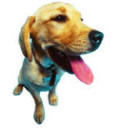
Pet Professional Tip
Praise the dog for positive chewing, sitting for
attention, and other positive behaviors.
Demonstrate to clients how to teach the "sit"
instruction and encourage them practice "learn to earn"
before giving their dog attention and privileges.
|
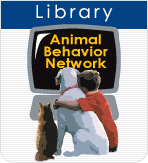 |
|
Help is at your
fingertips by library, email and
phone. |
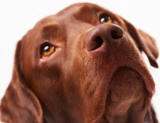
Click on
Library Icon
to learn more
|
Excessive licking may due to a
bad habit or a medical problem.
Dogs lick excessively to seek
attention, show submission. It
may also be a displacement
behavior. Neurologic,
endocrine,
hormonal, and other medical
conditions may also be
responsible for excessive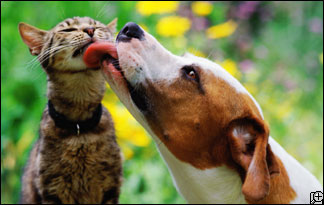 licking. Therefore, it is
essential to rule out any
medical condition that might
contribute to the problem
through your veterinarian.
Medical causes of behavior
problems...read
more.
licking. Therefore, it is
essential to rule out any
medical condition that might
contribute to the problem
through your veterinarian.
Medical causes of behavior
problems...read
more.
If the dog is
licking him or herself
excessively, it may be triggered
by allergies, infection, pain,
or an obsessive-compulsive
mental illness.
|
The dog should receive a
neutral response from the
person while enjoying the
"5-Lick Rule" and praise and
attention when not licking.
|
Attention-Seeking Behavior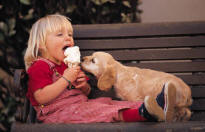
If the excessive licking is
attention-seeking
behavior, then giving the dog any attention
whatsoever during the licking process, such as
talking, petting, praising, or responding in any way
(even scolding), only encourages the licking and
promotes more of the same. Attention seeking
behaviors...read
more.
Submissive Behavior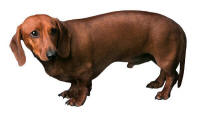
If the excessive licking is
submissive in origin, punishing
the licking only promotes the
behavior or may provoke an
aggressive response. The dog is
submissive in the first place,
so threats and anger from the
owner in response to excessive
licking is perceived by the dog
as domination. Since the dog is
attempting to communicate
submission in the first place,
scolding only increases the
desire to lick, or defend him or
herself aggressively. 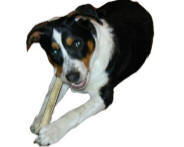
Displacement Behavior
If the excessive licking is a
displacement behavior, it is
performed to decrease arousal
and help the animal cope with a
stressful situation. Again,
punishment is not effective
because it will only make an
already anxious dog more
anxious. Instead, encourage and
praise the dog for positive
chewing. Teaching positive
chewing...read
more.
The Correct
Response to Excessive Licking
The
correct and optimal response to
licking is to ask the dog to do
an alternate behavior, such as
sit, and then praise the sitting
and reward that. For the
confirmed licker, some people
will allow a "5-Lick Rule." This
rule allows the dog to lick no
more than 5 times. Then he or
she must stop. This allows some
expression of their natural
desire but stops excessive
licking. The dog should receive
a neutral response from the
person while enjoying the
"5-Lick Rule" and praise and
attention when not licking. If
the dog goes beyond the allowed
five licks, interrupt the
behavior with a instruction such as
"off." Teaching off...read
more.
|